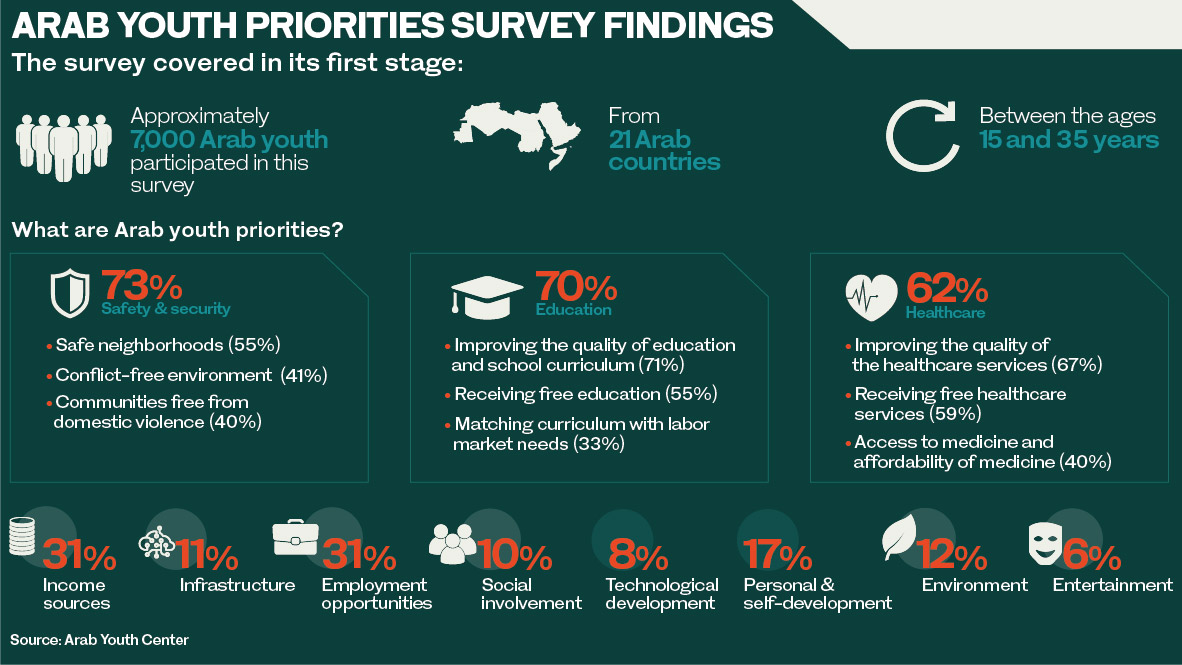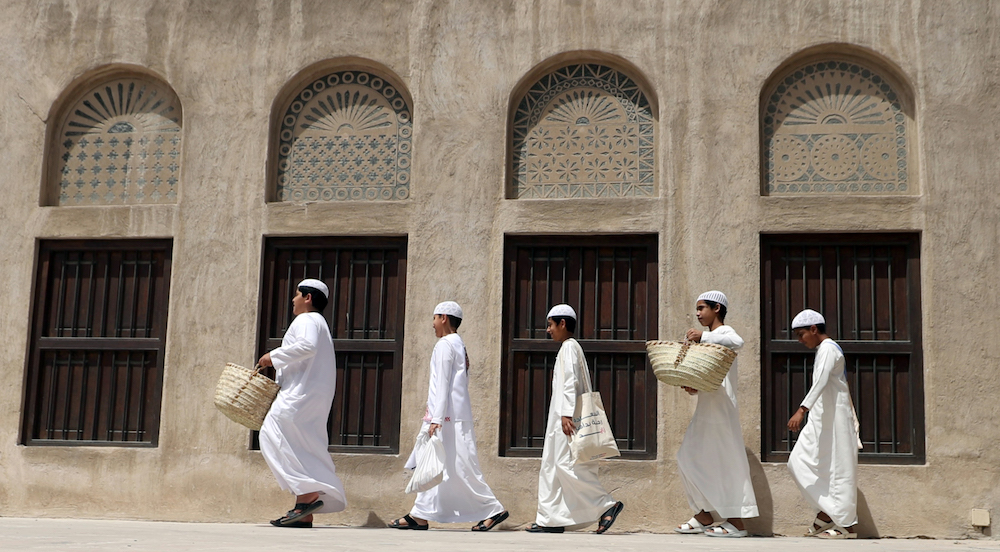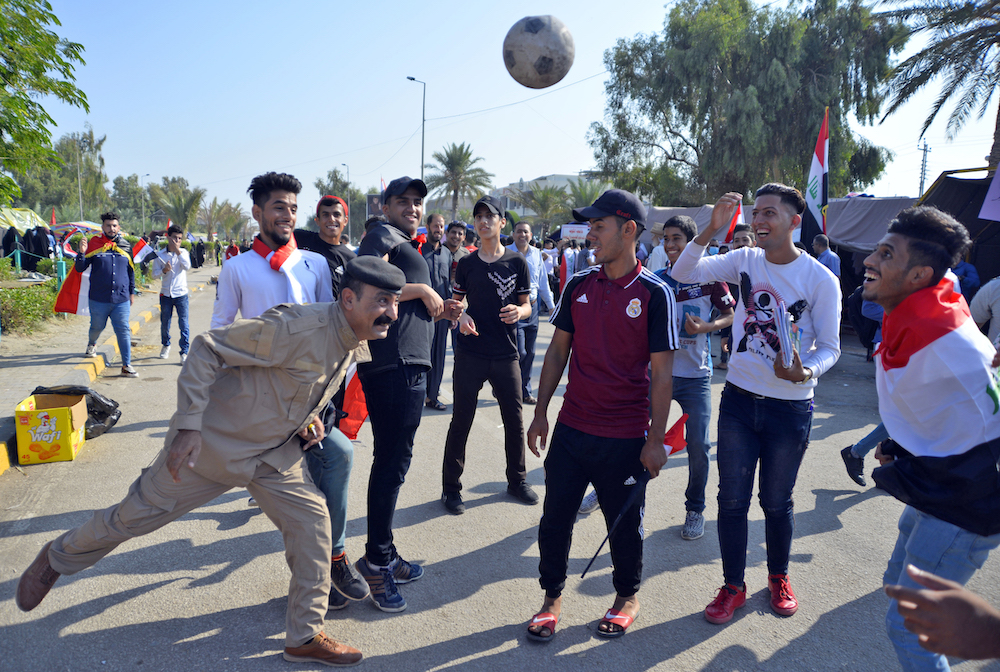DUBAI: If the quality of its youth is what determines the kind of future a nation will have, then the Arab world can draw strength from its share of the global supply.
People between the ages of 15-35 make up almost 34 percent of the region’s population — the highest concentration of youth in the world.
This young population, more educated than ever, has a real opportunity to make significant and positive contributions to the economic and social development of the region, according to a recent report by the Arab Youth Center, the “Arab Youth Priorities Survey.”

These sentiments were also expressed by Shamma bint Suhail Faris Al-Mazrui, UAE minister of state for youth affairs, during an exclusive interview with Arab News.
“I honestly believe if there’s a big change that can revolutionize the world, it would be done by a young person . . . and I think it’s time to unleash the potential of Arab youth entrepreneurs,” she said.
The study, which surveyed nearly 7,000 young people across 21 Arab countries, found that 73 percent of young Arabs chose stability as their top priority, followed by education (70 percent) and health (62 percent).
Al-Mazrui expressed optimism over the findings while touching on the aspirations of the Arab world’s youth population and the challenges ahead.

Shamma bint Suhail Faris Al-Mazrui, UAE minister of state for youth affairs. (Supplied)
A pervasive “lack of hope” among today’s youth is due to a combination of regional security and social and economic challenges, according to Al-Mazrui, who was first appointed to the government in 2016 at the age of 22. That said, Arab youth aspirations are not only attainable but can be exceeded — provided governments make available the proper platforms for unlocking their full potential.
The study, which was published on Aug. 12 to mark International Youth Day, shed light on 11 priorities in critical sectors including education, health, employment opportunities, sources of income, social life, self-development, environment, security, entertainment, infrastructure and technological development in each Arab country.
To meet young Arabs’ expectations, Al-Mazrui said that decision-makers and leaders had to view this segment of the population as an “asset” who drove development and were not “a problem or an issue.”
“I think one of the most important things that governments need to do is engage,” she told Arab News. “They need to start listening to the youth. I know it’s so simple, it sounds basic, but you need to be in their shoes, you need to have a kind of empathy.”
Al-Mazrui mentioned collaboration with Bahrain’s Ministry of Youth and Sport Affairs, which is led by a young Arab, and with the departments concerned of many other Arab states, including Egypt, Jordan and Kuwait.
THENUMBER
34%
The proportion of Arab world's population aged 15-35.
“I have been very inspired by the Arab nations that are focusing on building the leaders that tomorrow needs,” she said. “For instance, Saudi Arabia is focusing on empowering youth. Our neighbors in Bahrain have been ushering in amazing youth-engagement projects and youth empowerment. This shows that a lot of nations are betting on their young people and making them their top investment for their future.”
On the question of stability, the findings revealed three key elements of the priority, the most important being living in safe neighborhoods (55 percent), followed by living in a conflict-free environment (41 percent) and living in communities free of domestic violence (40 percent).
The results suggest that an awareness of the political and socio-economic impacts of conflicts in the Middle East had prompted a strong yearning for peace among young generations of Arabs.
“They want stability. They want security before anything else. They want their loved ones to be safe,” said Al-Mazrui, adding that even the basic needs of the youth in fragile Arab states are not being met. “Why (should they) live in fear every single day?”
Moving on to an issue that was, until recently, not openly discussed in most Middle East countries, Al-Mazrui said: “For me, it (the finding on domestic violence) was initially a bit surprising, maybe it’s because I come from the UAE and this has been tackled early on. I think it is a sign that in the Arab world it (domestic violence) is still an issue and there needs to be dialogue.

Emirati youths walk in Al Fahidi Neighbourhood, also known as Al Bastakiya, a historic district in Dubai, on April 26, 2018. (AFP/File Photo)
“It’s nice to see that all youth around the Arab world are trying to build a world that works, that is based on the values we see.”
In the survey’s other highlights, 71 percent of respondents expressed their keenness for a high-quality educational system, 55 percent would like to receive free education, and 33 percent want to see more curriculums that match the labor market’s needs.
The “Arab Youth Priorities Survey” categorizes Arab states into three groups – of high, mid and low purchasing power — while taking into account the significant macroeconomic differences between them. Al-Mazrui underscored the range of challenges within the education and health care sectors that young Arabs face. “Some youth just want access to education. (For) others who have wealth, it’s more about the quality of education — to be the best around the world,” she said.
The situation was similar regarding the quality and affordability of health care and medicine across the region. Al-Mazrui believes there is no limit to what technology can achieve, whether it is innovation in the field of robotic medical assistance or the possibility of medicine delivery via drones.
THE CRITICAL PRIORITIES OF ARAB YOUTH
Over the past decade, young people across the Arab region have been forced to confront the consequences of popular uprisings, prolonged conflicts and collapsing economies. The findings of the “Arab Youth Priorities Survey” reflect these realities while highlighting the hopes of new generations for a more prosperous future. The survey was conducted by the UAE’s Arab Youth Center, whose chairman is Sheikh Mansour bin Zayed Al-Nahyan, UAE’s deputy prime minister and minister of presidential affairs.
It was based on the responses of 7,000 young people in 21 Arab countries in the 15-34 age group, and found that the top three priorities of today’s Arab youth are stability, education and health. Analysts say the findings should be viewed in the context of the continued upheavals in the Middle East and North Africa. Since 2011, countries such as Syria, Libya, Yemen, Iraq and Lebanon have experienced severe disruptions as a result of political unrest, regime crackdowns and ensuing conflicts.
During this period, many families and children have lost their homes, jobs and rights to education and health care, according to Abeer Alnajjar, associate professor at the American University of Sharjah and researcher in Middle East politics. “Achieving their aspirations has become harder for the region’s youth with the future of these countries appearing gloomy in the near term,” she told Arab News. “The priorities in question have better prospects in some countries than others due to the differences in their economic, political and security conditions. But the fallout of the COVID-19 pandemic has made their economic, educational and employment situations worse.”
The current conditions will not equip future generations with the tools they need for a better life, she said, adding that they would in fact result in higher levels of illiteracy, violence and instability. To be sure, the state of Arab youth is not the same in every country, said Alnajjar. “On the one hand you have the well-off, highly educated elites. On the other hand, there are the underprivileged — the displaced, the unemployed, the youth who are out of school and out of social and health care systems.”
Noting that some Arab countries offer higher levels of security, health care, educational standards and opportunities for their youth, she said that a pan-Arab initiative could have a significant impact across the region. Alnajjar said the priorities identified by the Arab Youth Center study call for “major reforms” in the fields of education and employment. “Education is the starting point of the welfare of the society,” she said. “However, new approaches to education are needed as information and communication ecosystems, affordability, opportunities and risks are changing.”
Close to half of the survey’s respondents said that they wanted to live in environments and communities free of domestic violence. Commenting on the finding, Alnajjar said that economic welfare, respect for human rights, access to education, equal opportunity and the rule of law are all important pillars of social reform. “When people are taught how to think and talk, they rarely resort to violence,” she told Arab News.
While only time will tell what happens to today’s big ideas in the fields of science and technology, a more pressing question is how Arab governments can provide their youth with the opportunities they need to flourish, succeed and reach their full potential.
“At the end of the day, as government officials, we are designing. We are designers,” Al-Mazrui said. “How do we design the best ecosystem for a certain section of the population to thrive?”
Answering her own question, she pointed to the UAE youth ministry’s tasks and duties in the context of the seven crucial transitional stages that young people go through.
“There’s school to university; university to higher education; higher education to the labor market; the labor market to starting a family; finding housing; going to the national service in the UAE; and sometimes the labor market back to school for those who do their MBA,” she said.
With these stages in mind, Al-Mazrui likened her role as a youth minister catering for 50 percent of the UAE’s population to that of “an orchestra conductor” — working in coordination with government departments to address the challenges facing this vital demographic.
“If you have a garden, you’ll have different plants or trees. Similarly, there are the elite and engaged youth, the smart youth and the dropout youth, the youth who are orphans or who have disabilities,” she said.
“When you don’t have a ministry of youth, you’re basically excluding all these characteristics and segments of the young population. Our job is to include them all, to understand that each one needs a different kind of strategy.”

A member of the Iraqi security forces plays football with young protesters during anti-government protests in the central Iraqi holy city of Najaf on October 29, 2019. (AFP/File Photo)
As examples of inclusion and empowerment, Al-Mazrui pointed to nation-focused programs as well as pan-Arab skills-development initiatives such as the “Arab Reading Challenge” and the “One Million Arab Coders” educational platform.
“The greater risk is not taking radical risks for youth, because to not engage with the youth is to disengage from them; to not equip them is to directly hinder them; and not to empower them is to say we’re going to disempower youth,” she said.
At the end of the day, a country’s “return on investment” depends on how much it invests in its youth and its ability to succeed as a nation, Al-Mazrui said.
“It depends on how quickly (the country) is able to adapt and (steer) that youth energy into positive directions toward its economy, toward its social, cultural landscape and diplomatic landscapes.”
---------------------
Twitter: @jumana_khamis


























